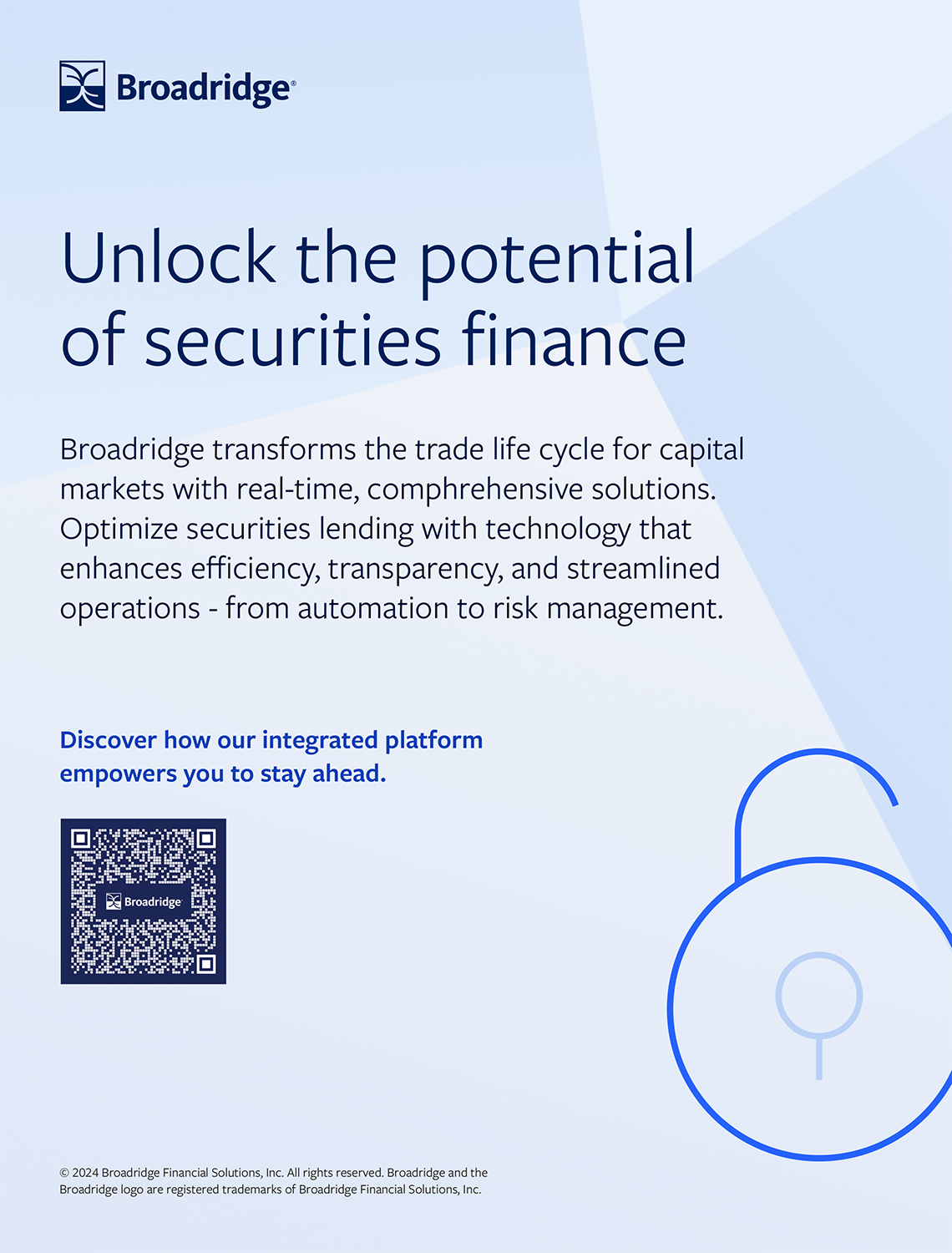TradFi and DeFi should be used in tandem, Securities Finance Technology Symposium panellists say
09 May 2023 US
 Image: immimagery/stock.adobe.com
Image: immimagery/stock.adobe.com
Traditional finance (TradFi) and decentralised finance (DeFi) can and should exist in tandem, speakers on the ‘TradFi vs DeFi’ panel at this year’s Securities Finance Technology Symposium in Boston affirmed.
Panellists noted that there are many benefits to adopting more DeFi systems, with Mike Norwood, head of EquiLend trading solutions, suggesting that traditional finance should consider applying DeFi strategies to TradFi problems to “remove inefficiencies and accelerate velocity”.
“It’s not an ‘either or’ situation, and we don’t have to move one way or the other,” he went on. Instead, firms should “look for what fits the purpose, look at a problem holistically and take bits and pieces to find the most appropriate solution.”
Another speaker added that smart contracts can be an effective way to reduce risk and improve control over assets. They urged market participants to research DeFi and find ways that it can improve their operations, predicting that those who fail to move with the market and understand DeFi will be left behind.
“You have to take the bull by the horns,” they stated, suggesting that firms work ahead of regulators and start using DeFi technology and solutions now. One speaker acknowledged that regulations can be slow and complex to develop, but argued that this is something that the industry should welcome — “they can’t make mistakes”. Market participants should find ways to operate DeFi technology within existing rules as they wait for specific regulation to be introduced, they advised.
One speaker maintained that there does not need to be a tension between what is interesting and what is compliant — elements of DeFi technology can and do operate within existing rules. However, “you can’t move faster than the regulators,” they affirmed.
Another panellist agreed that although a specific regulatory framework is necessary, technologies such as smart contracts are already able to operate within existing regulatory norms. They advocated for “using all the tools we have at our disposal” to enhance risk management, compliance and operations, reassuring that we don’t need to upend the entire infrastructure” to start using DeFi technology. The transition will be “an incremental process,” they predicted.
“It doesn't have to be TradFi versus DeFi,” one panellist explained. “They can comingle and coexist quite easily.” Another speaker added that this is not only a possibility but a necessity — the two must coexist to be successful.
Continuing the argument for coexistence, one panellist reflected on the perception of many that crypto and blockchain are a “solution without a problem”. He argued that this is not the case, with the possibility of tokenising real estate something that could “solve impending regulation problems in the investment management world.”
Considering benefits for the securities lending world, Norwood explained that a shared ledger, implemented by a technology vendor, could allow for a golden source of contract information, updated in sync, which would reduce the operational challenges around contract lifecycles. However, while it makes sense in certain market sectors and use cases, he suggested that there is not an argument for a total move to decentralised finance.
One speaker went on to say that the biggest barrier to adoption is not regulatory hesitancy but rather a lack of education and a fear of the unknown. They predicted that market participants will be inclined to experiment more in the DeFi space as they learn more about it.
Looking to the future, Norwood stated that “we need to reimagine what the industry should look like,” embracing elements of DeFi to solve specific problems. However, he warned that there should be a focus on improving, rather than only making digital versions of, existing systems.
The industry has a reliance on outdated legacy technology, Norwood said, with a lot of responsibility falling to technology vendors to drive change. However, he concluded, in order for progress to be made, clients must be open to change in both technology as well as behaviour.
Panellists noted that there are many benefits to adopting more DeFi systems, with Mike Norwood, head of EquiLend trading solutions, suggesting that traditional finance should consider applying DeFi strategies to TradFi problems to “remove inefficiencies and accelerate velocity”.
“It’s not an ‘either or’ situation, and we don’t have to move one way or the other,” he went on. Instead, firms should “look for what fits the purpose, look at a problem holistically and take bits and pieces to find the most appropriate solution.”
Another speaker added that smart contracts can be an effective way to reduce risk and improve control over assets. They urged market participants to research DeFi and find ways that it can improve their operations, predicting that those who fail to move with the market and understand DeFi will be left behind.
“You have to take the bull by the horns,” they stated, suggesting that firms work ahead of regulators and start using DeFi technology and solutions now. One speaker acknowledged that regulations can be slow and complex to develop, but argued that this is something that the industry should welcome — “they can’t make mistakes”. Market participants should find ways to operate DeFi technology within existing rules as they wait for specific regulation to be introduced, they advised.
One speaker maintained that there does not need to be a tension between what is interesting and what is compliant — elements of DeFi technology can and do operate within existing rules. However, “you can’t move faster than the regulators,” they affirmed.
Another panellist agreed that although a specific regulatory framework is necessary, technologies such as smart contracts are already able to operate within existing regulatory norms. They advocated for “using all the tools we have at our disposal” to enhance risk management, compliance and operations, reassuring that we don’t need to upend the entire infrastructure” to start using DeFi technology. The transition will be “an incremental process,” they predicted.
“It doesn't have to be TradFi versus DeFi,” one panellist explained. “They can comingle and coexist quite easily.” Another speaker added that this is not only a possibility but a necessity — the two must coexist to be successful.
Continuing the argument for coexistence, one panellist reflected on the perception of many that crypto and blockchain are a “solution without a problem”. He argued that this is not the case, with the possibility of tokenising real estate something that could “solve impending regulation problems in the investment management world.”
Considering benefits for the securities lending world, Norwood explained that a shared ledger, implemented by a technology vendor, could allow for a golden source of contract information, updated in sync, which would reduce the operational challenges around contract lifecycles. However, while it makes sense in certain market sectors and use cases, he suggested that there is not an argument for a total move to decentralised finance.
One speaker went on to say that the biggest barrier to adoption is not regulatory hesitancy but rather a lack of education and a fear of the unknown. They predicted that market participants will be inclined to experiment more in the DeFi space as they learn more about it.
Looking to the future, Norwood stated that “we need to reimagine what the industry should look like,” embracing elements of DeFi to solve specific problems. However, he warned that there should be a focus on improving, rather than only making digital versions of, existing systems.
The industry has a reliance on outdated legacy technology, Norwood said, with a lot of responsibility falling to technology vendors to drive change. However, he concluded, in order for progress to be made, clients must be open to change in both technology as well as behaviour.
NO FEE, NO RISK
100% ON RETURNS If you invest in only one securities finance news source this year, make sure it is your free subscription to Securities Finance Times
100% ON RETURNS If you invest in only one securities finance news source this year, make sure it is your free subscription to Securities Finance Times



